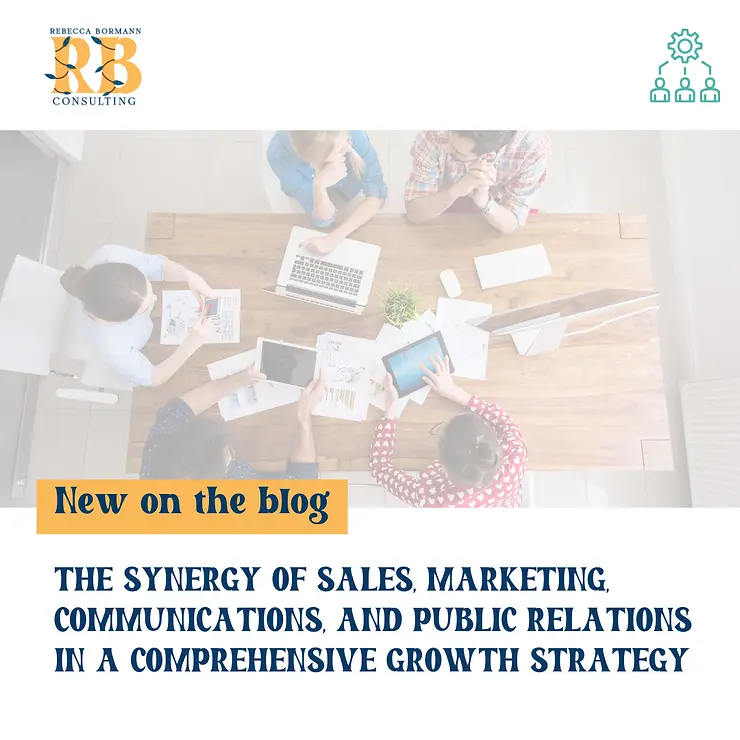

The successful growth of an organization, whether it’s a small to medium business, nonprofit or enterprise organization is the result of multiple business functions and strategies working together in harmony.
There are many common challenges when it comes to scaling an organization. Among others, top challenges include:
It’s the integration between the Sales, Marketing, Comms and PR functions and teams that solves these common challenges and sets your organization up for exponential growth. The traditional approach of segregating sales, marketing, communications, and public relations is giving way to a more holistic approach that underscores the vital importance of these elements working in tandem.
So long, to business growth functions operating in silos. No more, to sales and marketing having metrics, KPIs and goals that are misaligned. The modern business ecosystem thrives on connectivity, and a comprehensive growth strategy reflects this interconnectedness and provides a path for accelerated growth.

The Power of Integrated Business Functions and Teams:
1. Seamless Client Journey
At the heart of this integrated approach lies the client. A harmonized strategy ensures that a potential client's journey is smooth and consistent from the first interaction to the final purchase. Where collaboration, messaging, and branding are aligned throughout the buying process and throughout the customer experience. The interconnected functions ensure a comprehensive narrative and thoughtful experience. Sales, marketing, communications, and PR contribute distinct perspectives, yielding a multi-faceted understanding of the client wants and needs during the buying process. This vantage point informs decision-making, shapes the narrative, and enables the organization to create exceptional experiences for clients and stakeholders. A cohesive experience enhances client trust and loyalty with the employees they interact with as well as the overall brand.
2. Amplifying Reach
Each component contributes unique strengths. Marketing draws in potential clients, sales convert them into buyers, communications ensure consistent messaging, and public relations fosters goodwill. When these forces combine, the reach of a brand multiplies. An integrated strategy harnesses the power of cross-promotion, utilizing all available channels to create a resonating impact.
3. Data-Driven Insights
An integrated approach also leverages data more effectively. When Sales, Marketing, Comms and PR functions work together, the data they collect becomes a comprehensive resource. You get to see the WHOLE picture. Sales data can provide insights into client preferences, marketing data reveals engagement patterns, and communications and public relations data showcases brand perception. This complete view of data informs strategic decisions with more accuracy and precision.
4. Building Brand Identity
An integrated strategy ensures that every interaction a client has with the brand, whether through marketing campaigns, sales interactions, or public relations efforts, aligns with the intended brand image, mission, and values. Especially in our current landscape where clients and stakeholders are requiring more transparency and more action with regards to corporate responsibility, it's important everyone has the same message and facts regarding the organization’s ESG Factors. (ESG Factors are how a business operates with respect to environmental impact, social responsibility, and corporate governance practices.)
5. Crisis Management
With regards to crisis management, an integrated approach among sales, marketing, communications, and public relations is not just a strategic choice but effective and pragmatic because collaborative teams have quicker response times. As crises unfurl, these departments become interconnected pillars, collectively wielding the power to safeguard a company's reputation, maintain client trust, and navigate the challenge as a unified front. Sales and marketing teams possess a deep understanding of the target audience and clients, enabling them to tailor communication that resonates authentically during turbulent times. When these messages align with the broader narrative crafted by communications and PR professionals, a harmonious story emerges, avoiding confusion and enhancing credibility.
6. Cost and Resource Efficiency
Integration typically brings economies of scale, and it rings true in this case. An integrated approach between sales, marketing, and communications creates synergy between these functions and optimizes resource allocation, allows more attention to be placed on strategic initiatives, avoids duplication of efforts, and streamlines tasks and processes. For example, collaborative planning streamlines campaigns, leveraging shared insights to target the right audience effectively. Unified messaging minimizes the need for extensive revisions, conserving time. Cross-functional coordination also enhances data sharing, leading to informed decisions and agile adjustments. The pooling of expertise reduces the need for outsourcing, saving costs while maintaining quality.
Moreover, an integrated strategy maximizes ROI by ensuring that each department's efforts complement and reinforce the others, leading to more impactful outcomes. Ultimately, it’s a leaner, more efficient operational model that conserves resources, minimizes unnecessary expenditures, and amplifies the collective impact of sales, marketing, communications, and PR initiatives. I think we all enjoy efficiencies that allow us to achieve more with less!
7. Long-Term Sustainability
An integrated strategy is not just about short-term gains. It focuses on fostering reciprocal long-term relationships and a sustainable business model poised for growth. By creating consistent and valuable client experiences, businesses foster trust and loyalty that transcend individual transactions.
The importance of a comprehensive growth strategy that harmoniously combines sales, marketing, communications, and public relations cannot be overstated. This integration amplifies reach, enhances client experiences, and fosters brand loyalty. I can’t stress enough, embracing this synergy is not just a strategic move; it's a testament to a forward-thinking, adaptable, client focused and resilient business model that paves the way for success.
I’ll leave you with this as our quote of the day…

There’s always enough!
Rebecca
PS: If your organization is looking to accelerate growth and needs help creating a comprehensive growth strategy that leverages the synergy of Sales, Marketing, Communications, and Public Relations, let’s chat!